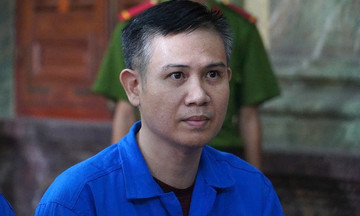In recent years, the influencer industry in China has boomed, reshaping the economic and cultural landscape. However, this rapid growth has been accompanied by troubling issues, from scams and counterfeit goods to inappropriate content and legal violations.
In response, Beijing has launched a vigorous cleanup campaign, employing strict measures to ban individuals and organizations that deviate from accepted standards.
From online trend to digital economy pillar
The influencer industry in China has evolved from a passing trend into a key business model, particularly in e-commerce, thanks to the country's massive online population and high social media usage.
According to Statista, the influencer marketing market reached $13.8 billion in 2023, with an annual growth rate of 16.3%. In the livestream shopping sector alone, China had over 750 million participants by the end of 2023, generating over 690 billion USD in e-commerce revenue.
The distinction between Key Opinion Leaders (KOLs) and Key Opinion Consumers (KOCs) is crucial. KOLs are typically celebrities or social media stars with huge followings (often over 500,000) and strong trendsetting abilities. They partner with major brands for large-scale advertising campaigns, creating widespread brand awareness. Top KOLs like Vi A and Li Jiaqi have earned billions of yuan in single livestream sessions, becoming powerful figures in the industry.
 |
Li Jiaqi, known as the "Lipstick King," rose to fame selling cosmetics on Taobao. Photo: VCG |
Li Jiaqi, known as the "Lipstick King," rose to fame selling cosmetics on Taobao. Photo: VCG
KOCs, on the other hand, are ordinary consumers with smaller followings but higher credibility. They share authentic product experiences and interact directly with their followers. The rise of KOCs reflects the growing consumer preference for real-life experiences.
Most major Chinese social media platforms, such as Douyin (the Chinese version of TikTok), Xiaohongshu (Little Red Book), Weibo, and Kuaishou, have become the main arenas for both KOLs and KOCs. Over two-thirds of Chinese advertisers have prioritized KOL/KOC marketing as their core strategy, demonstrating their importance in reaching and engaging consumers.
To further the industry's development, Multi-Channel Networks (MCNs) have emerged as management companies, providing professional training, content strategies, and resources to influencers. As of 2021, there were approximately 30,000 MCNs operating in China, creating a well-organized and professionally run industry. This explosive growth has made KOLs and KOCs essential bridges connecting brands with hundreds of millions of consumers.
Harmful practices exposed
The rapid but unchecked growth has exposed the industry's dark side. Numerous scandals have sparked public outrage, prompting stricter government regulations.
One of the most serious issues is fraud and the sale of counterfeit or low-quality goods. Many KOLs exploit their fans' trust for profit. A prime example is Dong Bei Wu Ti, a KOL with over 20 million followers on Douyin, known for entertaining short videos set in rural areas. "Wu Ti" sold snacks with a quality guarantee, promising triple compensation for counterfeits. However, a blogger specializing in exposing fake goods tested "Wu Ti's" sweet potato noodles and found no sweet potato. When the blogger visited "Wu Ti's" home for an explanation, they were assaulted by "Wu Ti's" group. "Wu Ti's" short videos were also revealed to be staged.
Some MCNs even create fake poverty scenarios, like the Liang Shan Meng Yang account, to gain views and then sell counterfeit or substandard goods to sympathetic viewers. When exposed, those responsible were fined and imprisoned for false advertising.
In 9/2024, Xiao Yang Ge, the first Douyin account to surpass 100 million followers, was fined 68.9 million yuan for false advertising, claiming mooncakes were made in Hong Kong when they were actually produced in mainland China, inflating the price from 169 yuan for three boxes to 700 yuan. Three Sheep, the MCN co-founded by Xiao Yang Ge, was ordered to cease operations.
Xin Ba, nicknamed "Kuaishou's Big Brother" with over 98 million followers, was fined in 2020 for selling fake bird's nests.
These scandals not only caused financial harm but also severely eroded consumer trust.
Inappropriate and offensive content is another pressing issue. Chinese authorities have targeted livestreams showcasing extravagant lifestyles, excessive food consumption (mukbang), or sexually suggestive content. These negatively impact social norms and youth lifestyles, forcing intervention to protect the "healthy development of cyberspace."
These scandals highlight failures in platform management, prompting the Chinese government to overhaul policies and enforcement.
The 'cyberspace cleanup' campaign
China's "cyberspace cleanup" campaign has three main goals: protecting consumer rights, controlling information, and regulating the economic order.
China's regulatory measures are comprehensive, encompassing legal regulations and enforcement campaigns. In 2016, the Cyberspace Administration of China (CAC) issued the "Provisions on the Administration of Internet Livestreaming Services," requiring platforms to implement "pre-broadcast censorship" and allowing immediate suspension of violating broadcasts.
The State Administration for Market Regulation (SAMR) later issued detailed regulations, clarifying the legal responsibilities of platforms, brands, and livestreamers. These regulations prohibit false advertising, counterfeit sales, and especially misconduct related to politics and social morality.
One of the most impactful measures was the "Qing Lang" campaign, a comprehensive online cleanup effort. In 2021, Douyin permanently banned over 300 accounts for spreading misinformation and maliciously slandering businesses. In 2023, Douyin indefinitely revoked livestreaming privileges for 290,000 accounts, including top streamers.
Authorities also established a "blacklist" for violating accounts and demanded increased platform oversight. Platforms must now verify account information during registration, standardize source labeling, manage information authenticity, label fictional content or controversial information, and strictly handle violations.
The "banning" mechanism, completely erasing an individual's online presence, has become a powerful deterrent.
A prominent example is "Sales Queen" Vi A, once a livestreaming success story with over 30 billion yuan in e-commerce sales in 2020. In 12/2021, the Zhejiang Provincial Tax Bureau discovered Vi A evaded 643 million yuan in taxes from 2019 to 2020 by concealing personal income, falsifying business transactions, and misreporting earnings.
She was fined a total of 1.341 billion yuan (approximately $210 million USD). Her accounts on major platforms like Weibo, Taobao, and Douyin were immediately shut down.
 |
Vi A was once China's "Sales Queen," with livestreams generating billions of yuan. Photo: Businesstoday |
Vi A was once China's "Sales Queen," with livestreams generating billions of yuan. Photo: Businesstoday
Vi A's downfall sent shockwaves, serving as a stern warning that no one is above the law. It triggered a wave of self-scrutiny and adjustments within the influencer community.
Following Vi A, in 9/2023, Douyin account "Xiu Cai," with over 12 million followers, was indefinitely banned from livestreaming for tax evasion and defrauding fans through investment schemes.
In 3/2024, the couple "Xiao Ma Ge" were exposed for staging fake content and fined over 3.17 million yuan for tax evasion. Their Douyin account, with over 10 million followers, was shut down for violating laws, regulations, and related policies.
In 10/2024, Dong Bei Wu Ti's accounts on major platforms were permanently banned for selling counterfeit goods and deceiving customers.
"Kuaishou's Big Brother" Xin Ba had his account closed for "failing to comply with community standards," forcing him to retire from livestreaming. Another Taobao "Big Brother," "Lipstick King" Li Jiaqi, has also faded from the public eye after several controversies involving his behavior and offensive remarks towards consumers.
This cleanup campaign has significantly reshaped China's influencer industry. The tightened regulations aim not only to punish violations but also to foster a more orderly, healthy, and compliant online business environment.
Tue Anh (according to Sina, 163, CAC)












